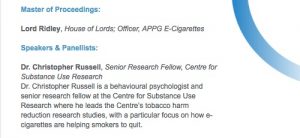
 Why is the All-Party Parliamentary Group on E-cigarettes hosting a debate headlined by a researcher funded by the tobacco lobby?
Why is the All-Party Parliamentary Group on E-cigarettes hosting a debate headlined by a researcher funded by the tobacco lobby?
The Great Vape Debate is being billed as a networking opportunity, with drinks and canapés. And it supposedly aims to “address a clear British anomaly”. According to the invitation, “Despite having created one of the most ‘pro-vaping’ regulatory regimes in the world, e-cigarettes still play only a small role in tobacco harm reduction strategies, and 80% of UK smokers have never tried an e-cigarette. It will bring together academics, public health NGOs, think tanks, vaping activists, stop smoking services and industry, as well as local councillors, MPs and peers.”
No mention of the tobacco industry, but — and in my book it’s a big but — the top-line panellist is Dr Christopher Russell, Senior Research Fellow, Centre for Substance Use Research.
According to the APPG, “Dr. Christopher Russell is a behavioural psychologist and senior research fellow at the Centre for Substance Use Research where he leads the Centre’s tobacco harm reduction research studies, with a particular focus on how e-cigarettes are helping smokers to quit.”
What they fail to mention is that both British American Tobacco and Philip Morris fund the Centre for Substance Use Research — as does Fontem Ventures, who is also providing a speaker for The Great Vape Debate.
I have no problem with e-cigs being promoted as a harm-reduction strategy — although I am deeply suspicious that so much of the research showing they are safe is funded by the tobacco industry.
But I am deeply suspicious of politicians, ‘researchers’ and media-medics signing up to the tobacco industry’s long-held survival strategy of maintaining sales of nicotine by changing the way it is delivered.
Take a look at Tobacco Explained: The truth about the tobacco industry …in its own words, which is available on the WHO website and you’ll see that BAT was exploring nicotine aerosols back in the 1960s.
And in 1977 BAT was alert to the need to keep users hooked on nicotine, warning: “There is a danger in the current trend of lower and lower cigarette deliveries – i.e. the smoker will be weaned away from the habit. If the nicotine delivery is reduced below a threshold ‘satisfactory’ level, then surely smokers will question more readily why they are indulging in an expensive habit.”
Which begs the question: How does this APPG and Dr Russell define ‘quitting’ — and my bet is the answer will be moving from cigarettes to e-cigs . (And on a point of pedantry, can the organisers be described as an ‘All-Party Parliamentary Group’ when five of the six members come from one party?)
As a former 40+ a day addict, I know how hard it is to quit, but let’s get real. Switching the delivery system for nicotine is not quitting — and the last thing BAT, Philip Morris and the other tobacco companies want is for people to give up nicotine.



Recent Comments